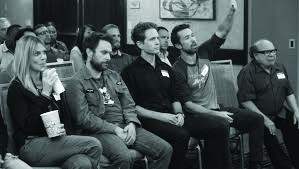BY TUCKER REILLY, MANAGING EDITOR
Last week, the FX sitcom “It’s Always Sunny in Philadelphia” premiered its 15th season, officially marking it as the longest running live-action sitcom in US history. The secret to the series’ longevity lies in its strong cast of characters, clever dialogue and constant boundary-pushing humor, which has allowed Sunny to garner an ever-increasing cult audience over nearly two decades. Additionally, the show has continued to produce quality content throughout its entire run, not suffering from the “late season fatigue” of many other sitcoms. With its unique comedic genius and historical precedent, It’s Always Sunny should be considered the greatest American sitcom of all time.
Like many sitcoms, Sunny is based on a simple premise: five friends run a bar in Philadelphia, concocting schemes and settling scores with the local population. Unlike its thematic predecessor “Cheers” however, Sunny endeavors from the start to prove that its core cast are the absolute worst people imaginable. In the second season alone, our core five make a fake terrorist threat video, get addicted to crack cocaine, solicit bribes from local politicians and start a deadly Vietnamese gambling ring in the basement, among other crimes. The genius of Sunny lies in this darkness, in showing the viewer each character’s rock bottom, then revealing that rock bottom is actually a cliff. Often the world around them acts as a universal straight man to the gang’s antics, although Sunny does occasionally relish in finding someone even crazier than its own characters.
One of the defining features of Sunny’s longevity is the show’s acceptance of change, in contrast to the sitcom norm of status quo. When Dennis (Glenn Howerton) and Dee (Kaitlin Olson) get addicted to crack cocaine or suffer heart attacks (on separate occasions), they remain encumbered with these problems, although the culmination of their sins make each but a single aspect of chaos within the overall storm. Frank Reynolds (Danny DeVito) enters the series as a disciplined, business-savvy father figure to the group, who gradually devolves into a near-animalistic train wreck of a human being over time. Characters have children, gain and lose dramatic amounts of weight, suffer permanent afflictions and occasionally die. Sunny understands that it’s characters are not a mere collection of gimmicks, however, and molds its comedy around the irreplaceable actors themselves.
It’s Always Sunny is an inherently character-driven comedy that mercilessly lambasts and pities its characters in equal measure. Many episodes of the show function like car wrecks, locking viewers into the sordid spectacle, while acknowledging the human flaws at each character’s center. And more often than not, there is something profound there: we are not these people, yet we understand where their fears, desires and insecurities come from before they are turned up to 11. We want to see them win or better themselves but crave the inevitable implosion of their despicable actions. The snowball rolls on, keeping us firmly stuck within an ever-expanding web of degeneracy.
It is also important to emphasize the exceptional talent brought to It’s Always Sunny by the cast and writing staff, who happen to be one in the same. The series’ core group of Rob McElhenney (the show’s creator), Charlie Day, Kaitlin Olson, Glenn Howerton and Danny DeVito have built larger-than-life characters around their own strengths and eccentricities, sharply refined over time. The cast’s familiarity, mixed with Sunny’s trademark rapid-fire dialogue, have allowed them to make nearly every scenario comedically valuable, while pushing the boundaries of the show to new heights. A key factor in this development has been creative freedom: due to the show’s relatively low profile on FX, McElhenney and co. have been allowed to stretch the series into strange new directions largely without restriction. While some creative decisions – such as the show’s ironic use of blackface – have been poorly received, Sunny has never lacked nuance in its satire. It’s Always Sunny is a unique and terrible creation developed by a singular set of people, consistently sustaining itself for over 15 years (even though we all know seasons five through nine are the best, of course). It deserves, without a doubt, a seat at the table as the greatest American sitcom of all time.









